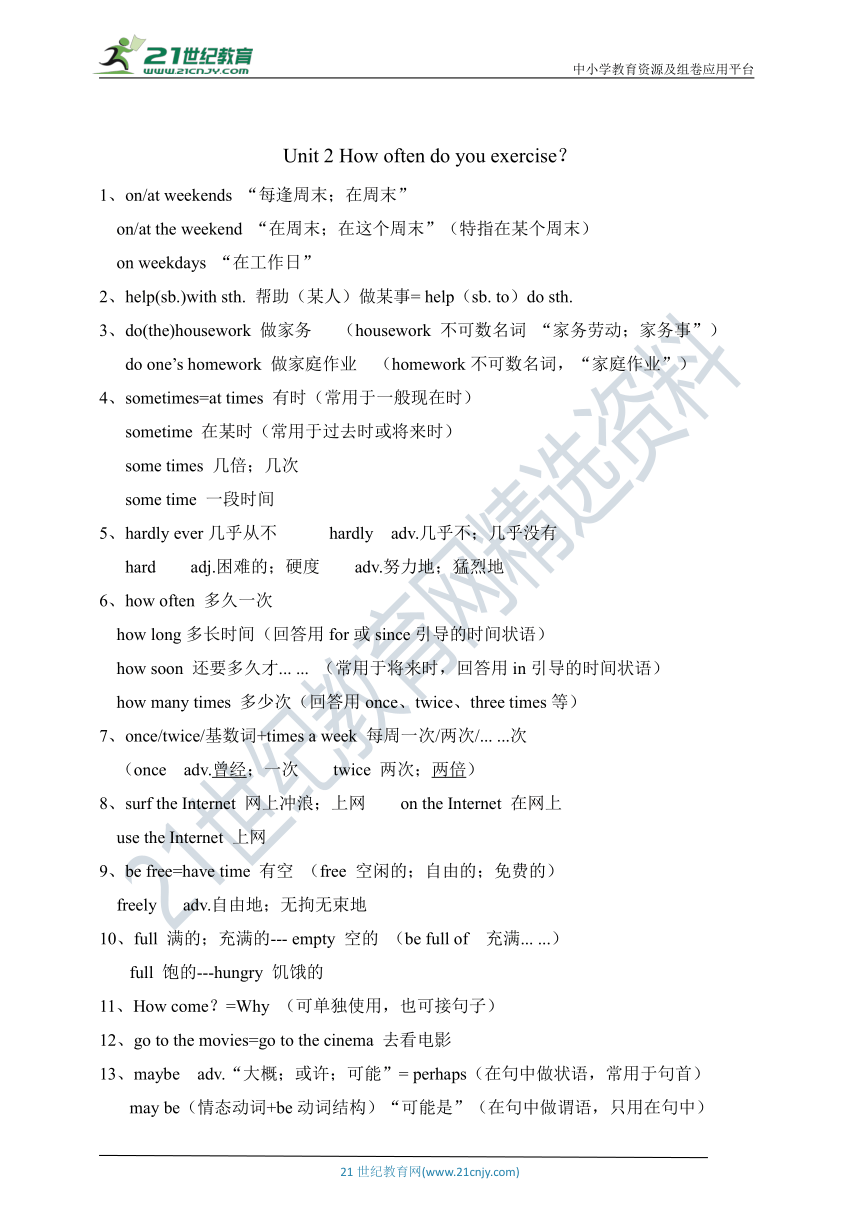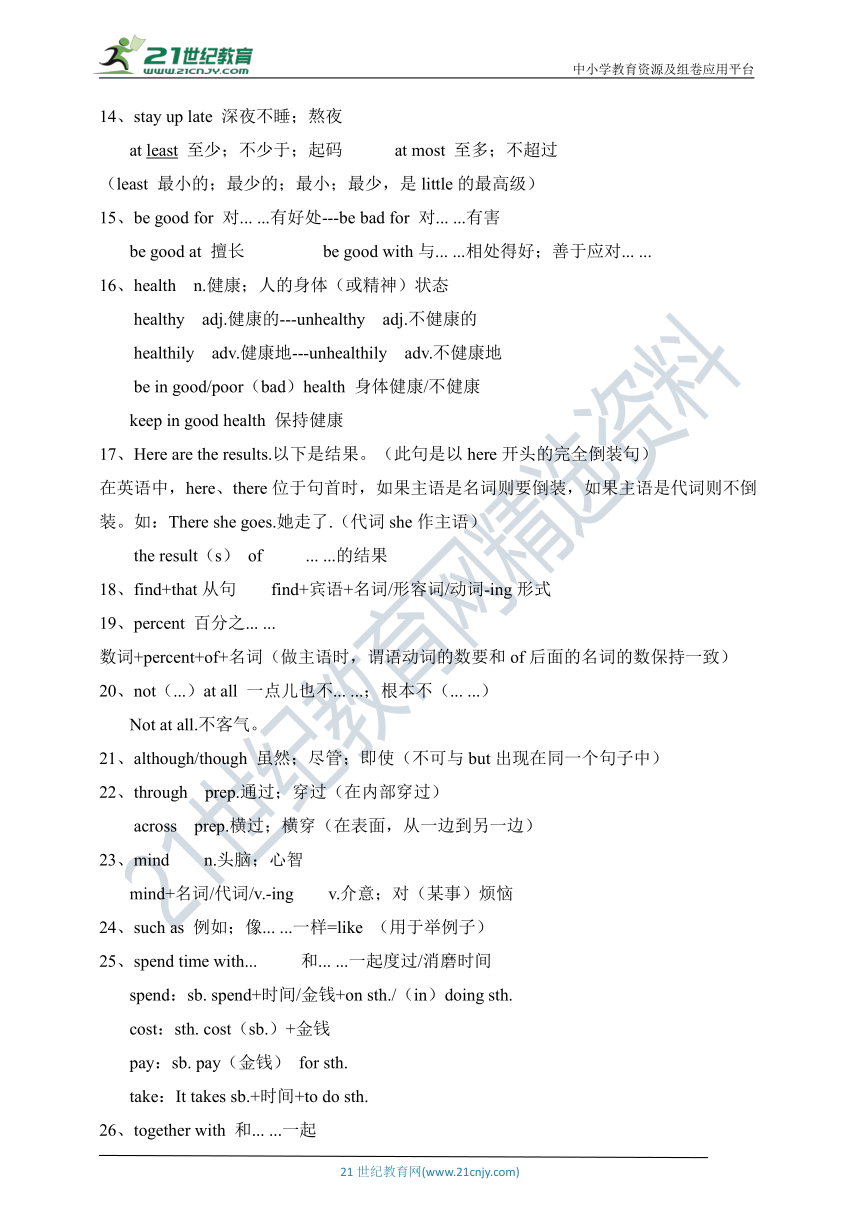Unit 2 How often do you exercise?知识点汇总
文档属性
| 名称 | Unit 2 How often do you exercise?知识点汇总 |  | |
| 格式 | zip | ||
| 文件大小 | 1.1MB | ||
| 资源类型 | 试卷 | ||
| 版本资源 | 人教新目标(Go for it)版 | ||
| 科目 | 英语 | ||
| 更新时间 | 2021-01-28 09:44:47 | ||
图片预览


文档简介
中小学教育资源及组卷应用平台
Unit
2
How
often
do
you
exercise?
on/at
weekends
“每逢周末;在周末”
on/at
the
weekend
“在周末;在这个周末”(特指在某个周末)
on
weekdays
“在工作日”
help(sb.)with
sth.
帮助(某人)做某事=
help(sb.
to)do
sth.
do(the)housework
做家务
(housework
不可数名词
“家务劳动;家务事”)
do
one’s
homework
做家庭作业
(homework不可数名词,“家庭作业”)
sometimes=at
times
有时(常用于一般现在时)
sometime
在某时(常用于过去时或将来时)
some
times
几倍;几次
some
time
一段时间
hardly
ever几乎从不
hardly
adv.几乎不;几乎没有
hard
adj.困难的;硬度
adv.努力地;猛烈地
how
often
多久一次
how
long多长时间(回答用for或since引导的时间状语)
how
soon
还要多久才...
...
(常用于将来时,回答用in引导的时间状语)
how
many
times
多少次(回答用once、twice、three
times等)
once/twice/基数词+times
a
week
每周一次/两次/...
...次
(once
adv.曾经;一次
twice
两次;两倍)
surf
the
Internet
网上冲浪;上网
on
the
Internet
在网上
use
the
Internet
上网
be
free=have
time
有空
(free
空闲的;自由的;免费的)
freely
adv.自由地;无拘无束地
full
满的;充满的---
empty
空的
(be
full
of
充满...
...)
full
饱的---hungry
饥饿的
How
come?=Why
(可单独使用,也可接句子)
go
to
the
movies=go
to
the
cinema
去看电影
maybe
adv.“大概;或许;可能”=
perhaps(在句中做状语,常用于句首)
may
be(情态动词+be动词结构)“可能是”(在句中做谓语,只用在句中)
stay
up
late
深夜不睡;熬夜
at
least
至少;不少于;起码
at
most
至多;不超过
(least
最小的;最少的;最小;最少,是little的最高级)
be
good
for
对...
...有好处---be
bad
for
对...
...有害
be
good
at
擅长
be
good
with与...
...相处得好;善于应对...
...
health
n.健康;人的身体(或精神)状态
healthy
adj.健康的---unhealthy
adj.不健康的
healthily
adv.健康地---unhealthily
adv.不健康地
be
in
good/poor(bad)health
身体健康/不健康
keep
in
good
health
保持健康
Here
are
the
results.以下是结果。(此句是以here开头的完全倒装句)
在英语中,here、there位于句首时,如果主语是名词则要倒装,如果主语是代词则不倒装。如:There
she
goes.她走了.(代词she作主语)
the
result(s)
of
...
...的结果
find+that从句
find+宾语+名词/形容词/动词-ing形式
percent
百分之...
...
数词+percent+of+名词(做主语时,谓语动词的数要和of后面的名词的数保持一致)
not(...)at
all
一点儿也不...
...;根本不(...
...)
Not
at
all.不客气。
although/though
虽然;尽管;即使(不可与but出现在同一个句子中)
through
prep.通过;穿过(在内部穿过)
across
prep.横过;横穿(在表面,从一边到另一边)
mind
n.头脑;心智
mind+名词/代词/v.-ing
v.介意;对(某事)烦恼
such
as
例如;像...
...一样=like
(用于举例子)
spend
time
with...
和...
...一起度过/消磨时间
spend:sb.
spend+时间/金钱+on
sth./(in)doing
sth.
cost:sth.
cost(sb.)+金钱
pay:sb.
pay(金钱)
for
sth.
take:It
takes
sb.+时间+to
do
sth.
together
with
和...
...一起
Old
habits
die
hard.
旧习难改。
die
v.---dead
adj.死的---death
n.死;死亡
消失;灭亡;死亡:die--died(过去式)--dying(现在分词,也可做形容词,“垂死的;临终的”)
28、16-year-old
十六岁时(是由“数词+名词+形容词”构成的复合形容词)
29、however
adv.然而;不过
(必须用逗号隔开,表示补充)
but
conj.但是(表转折,直接引出分句,一般不用逗号)
30、more
than
多于;超过=over----less
than
少于(less...
than
比...
...少;不如...
...多,常用于事物之间的比较)
more
than+数词+可数名词的复数形式(做主语时,谓语动词要用复数形式)
31、almost
几乎;差不多(一般不与not连用,但可以和no、none、nothing以及never连用)
32、point
可数名词
“得分;点”
v.
指;指向
point
to/at“指向”(to侧重所指方向;at侧重所指对象)
33、none(可指人/物,其后常与of连用;none
of
与不可数名词连用做主语时,谓语动词用单数形式;与可数名词连用作主语时,谓语动词用单复数皆可)
no
one(只能指人,其后不能与of连用;作主语时,谓语动词用单数)
21世纪教育网
www.21cnjy.com
精品试卷·第
2
页
(共
2
页)
HYPERLINK
"http://21世纪教育网(www.21cnjy.com)
"
21世纪教育网(www.21cnjy.com)
Unit
2
How
often
do
you
exercise?
on/at
weekends
“每逢周末;在周末”
on/at
the
weekend
“在周末;在这个周末”(特指在某个周末)
on
weekdays
“在工作日”
help(sb.)with
sth.
帮助(某人)做某事=
help(sb.
to)do
sth.
do(the)housework
做家务
(housework
不可数名词
“家务劳动;家务事”)
do
one’s
homework
做家庭作业
(homework不可数名词,“家庭作业”)
sometimes=at
times
有时(常用于一般现在时)
sometime
在某时(常用于过去时或将来时)
some
times
几倍;几次
some
time
一段时间
hardly
ever几乎从不
hardly
adv.几乎不;几乎没有
hard
adj.困难的;硬度
adv.努力地;猛烈地
how
often
多久一次
how
long多长时间(回答用for或since引导的时间状语)
how
soon
还要多久才...
...
(常用于将来时,回答用in引导的时间状语)
how
many
times
多少次(回答用once、twice、three
times等)
once/twice/基数词+times
a
week
每周一次/两次/...
...次
(once
adv.曾经;一次
twice
两次;两倍)
surf
the
Internet
网上冲浪;上网
on
the
Internet
在网上
use
the
Internet
上网
be
free=have
time
有空
(free
空闲的;自由的;免费的)
freely
adv.自由地;无拘无束地
full
满的;充满的---
empty
空的
(be
full
of
充满...
...)
full
饱的---hungry
饥饿的
How
come?=Why
(可单独使用,也可接句子)
go
to
the
movies=go
to
the
cinema
去看电影
maybe
adv.“大概;或许;可能”=
perhaps(在句中做状语,常用于句首)
may
be(情态动词+be动词结构)“可能是”(在句中做谓语,只用在句中)
stay
up
late
深夜不睡;熬夜
at
least
至少;不少于;起码
at
most
至多;不超过
(least
最小的;最少的;最小;最少,是little的最高级)
be
good
for
对...
...有好处---be
bad
for
对...
...有害
be
good
at
擅长
be
good
with与...
...相处得好;善于应对...
...
health
n.健康;人的身体(或精神)状态
healthy
adj.健康的---unhealthy
adj.不健康的
healthily
adv.健康地---unhealthily
adv.不健康地
be
in
good/poor(bad)health
身体健康/不健康
keep
in
good
health
保持健康
Here
are
the
results.以下是结果。(此句是以here开头的完全倒装句)
在英语中,here、there位于句首时,如果主语是名词则要倒装,如果主语是代词则不倒装。如:There
she
goes.她走了.(代词she作主语)
the
result(s)
of
...
...的结果
find+that从句
find+宾语+名词/形容词/动词-ing形式
percent
百分之...
...
数词+percent+of+名词(做主语时,谓语动词的数要和of后面的名词的数保持一致)
not(...)at
all
一点儿也不...
...;根本不(...
...)
Not
at
all.不客气。
although/though
虽然;尽管;即使(不可与but出现在同一个句子中)
through
prep.通过;穿过(在内部穿过)
across
prep.横过;横穿(在表面,从一边到另一边)
mind
n.头脑;心智
mind+名词/代词/v.-ing
v.介意;对(某事)烦恼
such
as
例如;像...
...一样=like
(用于举例子)
spend
time
with...
和...
...一起度过/消磨时间
spend:sb.
spend+时间/金钱+on
sth./(in)doing
sth.
cost:sth.
cost(sb.)+金钱
pay:sb.
pay(金钱)
for
sth.
take:It
takes
sb.+时间+to
do
sth.
together
with
和...
...一起
Old
habits
die
hard.
旧习难改。
die
v.---dead
adj.死的---death
n.死;死亡
消失;灭亡;死亡:die--died(过去式)--dying(现在分词,也可做形容词,“垂死的;临终的”)
28、16-year-old
十六岁时(是由“数词+名词+形容词”构成的复合形容词)
29、however
adv.然而;不过
(必须用逗号隔开,表示补充)
but
conj.但是(表转折,直接引出分句,一般不用逗号)
30、more
than
多于;超过=over----less
than
少于(less...
than
比...
...少;不如...
...多,常用于事物之间的比较)
more
than+数词+可数名词的复数形式(做主语时,谓语动词要用复数形式)
31、almost
几乎;差不多(一般不与not连用,但可以和no、none、nothing以及never连用)
32、point
可数名词
“得分;点”
v.
指;指向
point
to/at“指向”(to侧重所指方向;at侧重所指对象)
33、none(可指人/物,其后常与of连用;none
of
与不可数名词连用做主语时,谓语动词用单数形式;与可数名词连用作主语时,谓语动词用单复数皆可)
no
one(只能指人,其后不能与of连用;作主语时,谓语动词用单数)
21世纪教育网
www.21cnjy.com
精品试卷·第
2
页
(共
2
页)
HYPERLINK
"http://21世纪教育网(www.21cnjy.com)
"
21世纪教育网(www.21cnjy.com)
同课章节目录
- Unit 1 Where did you go on vacation?
- Section A
- Section B
- Unit 2 How often do you exercise?
- Section A
- Section B
- Unit 3 I'm more outgoing than my sister.
- Section A
- Section B
- Unit 4 What's the best movie theater?
- Section A
- Section B
- Unit 5 Do you want to watch a game show?
- Section A
- Section B
- Unit 6 I'm going to study computer science.
- Section A
- Section B
- Unit 7 Will people have robots?
- Section A
- Section B
- Unit 8 How do you make a banana milk shake?
- Section A
- Section B
- Unit 9 Can you come to my party?
- Section A
- Section B
- Unit 10 If you go to the party, you'll have a grea
- Section A
- Section B
